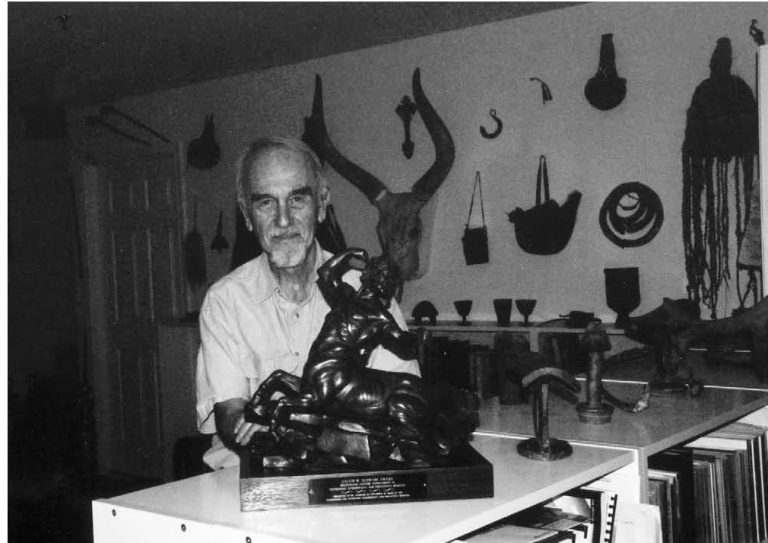Rick Ross is a cult expert and intervention specialist with more than 30 years of experience investigating controversial groups and movements. He is founder and executive director of the non-profit organization, the Cult Education Institute, and author of the book, “Cults Inside Out: How People Get In and Can Get Out“.
EDITOR’S NOTE: HIGHLIGHTS FROM THE INTERVIEW HAVE BEEN CONDENSED AND EDITED BELOW FOR CLARITY.
What was your motivation to study this field?
Rick Ross: I started out of a personal interest in 1982. My grandmother lived in a Jewish nursing home, and I used to go visit her. I went to the nursing home to find out that a very extreme fringe religious group had encouraged its members to covertly infiltrate the paid professional staff of the nursing home, to target the elderly, for the purposes of proselytizing. And my grandmother was harassed, and she talked with me about it. At first I didn’t understand what she meant when she said someone was yelling at her and telling her she was doomed. I asked her, Who is this person? She explained that it was one of the nurse’s aids. That led me to going to the director of the nursing home. As we dug into it, we found that there were a number of staff people involved, and they were terminated. So that led to me becoming involved in the issue of radical authoritarian groups.
What started out as a personal situation just kind of grew and grew to where I’m at now. My work has taken me around the world. I’ve done about 500 interventions to date, and my work really expanded to include – beginning in the late 80s – court expert witness work to testify on radical or extremist groups and their methodology of manipulation. In the early 90s, I began to be invited to lecture at universities and colleges. To date, I have lectured at more than 30 universities across the United States and in China and Thailand. Then I also consulted as a news analyst for CBS, and I’ve been in about 13 documentaries. One thing I should probably add that’s important is that in 1996, I decided to start sharing my personal files about various groups and leaders online. Eventually the website evolved into an online library.
Was there any reason in developing this website, in making this information public at that time?
R.R.: There was an organization called the Cult Awareness Network, and it was destroyed by the Church of Scientology through more than 100 lawsuits. I knew people in the Cult Awareness Network and admired their work. They collected all kinds of information about radical and extreme groups.
When I launched what now is the Cult Education Institute’s online database, my thinking was, Why not make that immediately accessible for the general public?
How would you define cults?
R.R.: I basically identified three core criteria, which were first identified by a psychiatrist at Harvard, Robert Jay Lifton. One: the group has an authoritarian leader that becomes an object of worship and is the defining element of the group. That is, the group is personality-driven and defined by a living leader who has absolute totalitarian power. Number Two: there is evidence the group uses thought-reform to gain undue influence over its members and manipulate them.
 Photo Credit: Pixabay/Tim Evans
Photo Credit: Pixabay/Tim Evans
And then Number Three: having accomplished that and being in a position of exercising undue influence, the group and leader use that to exploit and do harm to the people in the group. That varies by degree from group to group. For example, some groups are just interested in money, free labor. Other groups may be far worse. They may sexually abuse, physically abuse members; they may have edicts or beliefs that gravitate toward medical neglect and deny medical care and people die; they may be violent or criminal.
In the past thirty years, have you noticed patterns in the formation of cults and their followers?
R.R.: As the years have gone by, particularly since I became involved in accumulating information through the internet, I believe there were something like 5000 identified groups within North America, and then the Europeans identified thousands of groups, and now thousands of groups have been identified in Asia. What I’ve seen is that this is a global phenomena that affects every country and that there are many small groups.
 I wrote a chapter in my book looking at groups that are as few as a hundred or less, and I also have a chapter about what I call family cults, which we’re seeing much more, where there is typically a patriarchal leader that has absolute power over a family or a kind of grafted-together, contrived family. I wrote about such groups as Marcus Wesson in Fresno, California; Winifred Wright in the Bay Area; Peter Moses, Jr. in North Carolina; and Brian Mitchell, the man who kidnapped Elizabeth Smart. Back in the 80s, we were only aware of really large groups, like Reverend Moon’s Unification Church, Scientology, the Hare Krishna movement.
I wrote a chapter in my book looking at groups that are as few as a hundred or less, and I also have a chapter about what I call family cults, which we’re seeing much more, where there is typically a patriarchal leader that has absolute power over a family or a kind of grafted-together, contrived family. I wrote about such groups as Marcus Wesson in Fresno, California; Winifred Wright in the Bay Area; Peter Moses, Jr. in North Carolina; and Brian Mitchell, the man who kidnapped Elizabeth Smart. Back in the 80s, we were only aware of really large groups, like Reverend Moon’s Unification Church, Scientology, the Hare Krishna movement.
We didn’t realize that there were these very small groups. One of the features of the Cult Education Institute is the forum or message board, which has more than 130,000 individual entries, and that gives anyone the ability to come to the board and discuss what would be an otherwise obscure group that no one would even know about, because usually it takes a tragedy to bring a group to our attention.
I mean, would we know anything about Charles Manson and his group The Family, which was such a small group, if it wasn’t for the Tate/Labianca murders? It usually takes something that the media becomes attentive to because it’s tragic, it’s criminal, it’s dramatic, and it generates media interest. There are many groups just flying under the radar, and no one knows about them unless something awful happens.
So for someone who’s involved in a group that is under the radar, what is your advice in trying to determine underlying motivations?
R.R.: I’ll give you some basic building blocks. Number One: Accountability. How is the leadership accountable? Is there a constitution; are there bylaws; is there oversight? Is there a democratic form of governance of the group? Number Two: What kind of transparency is there? Particularly if money’s involved. Is there an independently audited financial statement? Is there an annual budget that discloses all compensation and salaries? Number Three: Does the group have a pattern of grievances and complaints? Are there former members who consistently point out the same bad behavior?
It’s not about beliefs. . . . That’s irrelevant. It’s behavior.
And here’s a kind of interesting question to ask: Is there a legitimate reason to leave? Can people just say, “I’m not interested in this group anymore; I want to leave”? Do the members of the group tend to shun and cut that person off?
Another question to ask is, Can the leader be wrong? Is there a legitimate basis to criticize the leader? Can you say, “You know, I think this group has made some mistakes; these are things I think we need to look at, because they’re not working”? Can the group or leader handle that? Or do they characterize any criticism as something bad, so they attack the person who brings up these issues? When a group cannot handle any kind of criticism, even the most constructive criticism, that’s a warning flag.
If you’re really asking questions and assessing things, you can begin to see a pattern, and then you can see if this is an authoritarian group, or if it’s not an authoritarian group, whether it’s a potentially unsafe group or a benign group.
It’s not about beliefs. It’s not about saying these beliefs should be bad because they’re not my beliefs; that’s irrelevant. It’s behavior. A group could be authoritarian; they could have a charismatic leader; they might even promote a mindset which might be eerily clone-like, but what if the group does no harm? I’ve seen groups like that. It is possible for a group to be called a cult but be a benign cult.
Or that cult could just not be figured out yet. There could be certain truths that are not out in the open, that no one has complained about yet.
R.R.: Well let me put it to you this way. I lived in Arizona for 40 years and there is a group there called Arcosanti. It was started by the architect Paolo Soleri and he created a philosophy called Arcology. And the group was perpetually building a city that would never finish, north of Phoenix, and the city was called Arcosanti. It was very interesting, a little bit Frank Lloyd Wright, a little bit sci-fi, and many architecture students would go there; they would work on the city; some of them for years. They did seem to worship Paolo Soleri. They idolized him. He also had property in Scottsdale, and many of the people would work making bronze bells, which became very famous, the Cosanti Bells. Arcosanti still exists even though Paolo Soleri died some years ago. But all the years I was in Arizona, I never even received a single complaint. I would receive inquiries. People would say that group’s kind of odd, the way they seem to just glow looking at Paolo Soleri. But I never once had a former member call and say, Paolo Soleri is a cult leader and he hurt me, and this is what he did. So I think it is possible for a group to be seen as a cult, but they could be benign.
Another example would be the Amish, who are very much apart from mainstream society, and who I do not receive complaints about.
Related article: “THE AMISH, A POTENTIAL SUSTAINABLE-LIVING MODEL“
In your book you mention cult-like behavior, and one that stood out was the dramatic loss of spontaneity and sense of humor. Could you elaborate?
R.R.: When you’re becoming clone-like in a typical destructive cult, the leader is the prototype for the perfect person. Everyone wants to emulate the leader and in the process the leader is making people over in his own image. It’s usually a man, though sometimes it could be a woman. People lose their spontaneity; they lose their own sense of how they express themselves, and they replace that with a kind of group program, and that’s why they came up with the term “deprogramming” to describe unraveling that program.
What you see in many of these groups, particularly the most extreme groups, is the people acting the same and emulating the leader, and even using the same catchphrases, the same slogans and mantras as the leader. You increasingly lose yourself, your own individual themes of expression, and the group encourages you to replace that with their jargon, their way of being.
 Photo Credit: Pexels/Aaron Mello
Photo Credit: Pexels/Aaron Mello
Lifton has eight criteria to determine the existence of a thought-reform program, and one of them is loaded language, which are thought-terminating clichés, for example, Suppressive Person (SP) in Scientology, [as in someone] saying, “Oh that person’s an SP.” Click. Thought terminated. “I don’t need to think about what that person says, because they’re an SP.”
Lifton has another criteria, Doctrine over Person, which is the cataloguing of your feelings vis-à-vis the doctrine of the group to determine which are valid and which are not. Your personhood is being subjected to the group’s rigid control in that sense, and you learn to suppress those feelings. Another one of Lifton’s criteria is the Demand for Purity, which is the purging of those thoughts, feelings that are inconsistent, because the group says that you are either pure or impure. In this sense they force you into a position where you must purge. Another is the Cult of Confession, which is the way in which the group examines and then plies you, and then brings out those things to be purged.
Whenever you are in a more vulnerable state, you are more easy to manipulate.
By getting that information, to understand all the weaknesses of the individual, all the pressure points then leads to another one of Lifton’s criteria, Mystical Manipulation, the ability to manipulate people. If you’ve informed through the Cult of Confession, it can seem mystical when you’re being manipulated because you’re thinking, How do they know what I need, what I feel? And you’ve forgotten that they have that information.
In your book you talk about Large Group Awareness Training (LGAT), which is seemingly about promoting someone’s life, their career, but follows thought-reform techniques. Do you find that these organizations are more prevalent today?
R.R.: Well it’s an incredibly lucrative business. People make millions and millions of dollars from these seminars. For example, Landmark Education, they bill 75 to 100 million dollars a year, selling their seminar. They’re the big kahuna of LGATs.
An LGAT is a vehicle to download the philosophy of the founder of that LGAT, so in the case of [Landmark creator] Werner Erhard, he cobbled together a composite philosophy, a little bit of Heidegger, a little bit of Esalen, the encounter seminar group in California I regard as benign, and he took a little from Scientology as well, and he put it together into a seminar series. Basically the purpose of the seminar series is to inject his philosophy into the participants as an end-all, cure-all for everything. In other words, when you go through it, essentially it’s an epiphany to mirror the philosophy and the worldview of Werner Erhard.
The human mind is much more fragile than we would like to believe. We’re all susceptible to suggestion.
This is the same story in every LGAT that I’ve encountered. The LGAT founder uses the LGAT to download his or her philosophy to the participants in a seminar form, as a cure-all for anything and everything in life – your job, your relationship, it could be just that hazy feeling you have that you’re not sure about your life, whatever. They don’t say that, though. They don’t admit that what they’re selling is a belief system. They tend to spin it as a technology, as some kind of educational experience, but it isn’t really. It is about the idiosyncratic philosophy of the leader and founder of the LGAT. And what they do in order to put you in a position to accept that philosophy is in my opinion coercive persuasion. That is, they first bring you in and they break you down. And they have sessions where people are confessing, and they’re crying and it’s cathartic, and then there may be trance induction or self-hypnosis or guided imagery techniques that they use to make people more suggestible.
 Photo Credit: Pexels/Lalesh Aldarwish
Photo Credit: Pexels/Lalesh Aldarwish
The problem with this is some people can’t handle it, and they become overwhelmed. I’ve had many people call me and say, “I went to this LGAT and I ended up in the hospital because I had a psychotic break.” Or someone calls me and says, “My family member is now in the hospital, and all I know is they went to Landmark. They’re in like a catatonic state; they had a breakdown; I don’t know what to do.” I’ve had calls like that many times.
What are the greatest challenges from these organizations, when you make something known or testify in court?
R.R.: Well I’ve had my life threatened. I was under the protection of the Justice Department when a group led by a guru by the name of Rama Behara had me on a hit list, along with many other people they wanted to murder. I’ve had Scientology spend I don’t know how much money on lawyers, private investigators harassing me, I’m certainly on their list of Suppressive Persons. They’ve gone door to door in my neighborhood to harass me. I’ve had one group literally hire somebody to go through my garbage. This same group, NXIVM, illegally through the private investigation firm Interfor, which is a big operation on Madison Avenue – NXIVM paid them to go after me, and they went into my banking records, phone records, illegally. That came out in federal court, and I sued them, and my attorneys settled that case.
I’ve been sued five times by groups seeking to intimidate me, including Landmark Education, to remove information from the web. First they threaten me, they say, “Look, either you take that information off the web or we’re going to come after you.” And their strategy is basically to do to me what Scientology did to the Cult Awareness Network, which is, “We’ve got more money than you do, so we’ll bankrupt you by running up outrageous fees with attorneys.”
I’ve been fortunate to be represented pro bono by some of the finest law firms in the United States, and by a number of First Amendment-focused attorneys that feel that freedom of speech is a two-way street: Groups called cults have the right to speak freely in society, and people have the right to respond by sharing criticism to the general public. I’ve been sued five times, and guess what? They lost, and I prevailed. But hey, it isn’t fun having people harass you like that, but the way I look at it is, that’s the best testimonial for someone in my line of work.
Do you find that there is a correlation between cult-like behavior and the current rise in populism?
R.R.: I think that we live in an overwhelmingly complex world that many people are struggling to sort out. Technology is moving at a very rapid pace; globalization is occurring; automation is occurring. There are societal changes and shifts, and some people feel overwhelmed by it.
Whenever you are in a more vulnerable state, you are more easy to manipulate. There are charismatic leaders that can become an object of worship, and they can use populism to manipulate and exploit people. That can be a problem. But in a democratic government, where people have the right to vote and where there is accountability and there is transparency, hopefully that can be ridden through. In other words, we can work it out.
 Photo Credit: Pexels/Lalesh Aldarwish
Photo Credit: Pexels/Lalesh Aldarwish
Oftentimes people want someone to give them the answers, and the good thing about authoritarianism is the leader says and the group conveys the idea that they do have all the answers. Whatever your dilemmas are, your confusion, it can be alleviated. Just let the leader tell you what to do; let the leader tell you what the answers are. This group has the answers, and if you surrender yourself to the group, then it will all be resolved. That can be very appealing to people in distress, and this is why groups frequently target people that are in some level of isolation or distress.
For example, it was recently reported that Jehovah’s Witnesses actually go through the obituaries to get names of recently widowed people to target them, to go to their door. I remember it happened to my mother, and I didn’t put it together! My father died; my mother was a widow, and she says to me, “Rick, the Jehovah’s Witnesses just keep coming over here. They won’t leave me alone.” So one of them came one day, and I had words with the lady, and that was the end of it!
You know how I did it? There’s a book written by a former member of Jehovah’s Witnesses. His name is Raymond Franz and he wrote “Crisis of Conscience,” which is the book if you want to dig into and understand what’s behind Jehovah’s Witnesses. So when this woman came to my mom’s door, I said, “I’m glad you’re here. I’d like to talk with you about this book.” And Witnesses have been told, You cannot look at this book! If you read this book, you may be “disfellowshipped,” which means thrown out of Jehovah’s Witnesses and shunned – no Witness will speak to you. So the woman looked at me like I’d said something horrible – she was in shock! I said, “There are a lot of things in this book” – I had a copy with me – “I would like to sit and talk with you about, because I don’t understand them, and you’re a Witness, and of course you would.” And she literally – well, she didn’t run, but she walked very fast when she left.
People will say, “What type of person could be caught up in a cult?” It could be anyone. A common thread is someone at a point where they are having difficulties, and then they have the bad luck to be approached by the group, or it could be someone they know who is involved in the group and is a person they trust who then at a point of vulnerability says, Come and check this out.
 Photo Credit: Pexels/Ingo Joseph
Photo Credit: Pexels/Ingo Joseph
Most of us would like to think, “No, it couldn’t happen to me.” Get over it. I have deprogrammed five medical doctors. These are people that are highly sophisticated, very educated, but they were recruited into cults because they’re human. The human mind is much more fragile than we would like to believe. We’re all susceptible to suggestion, and what has commonly been called brainwashing is really nothing more than a synthesis of persuasion, of influence techniques, focused like a laser by a particular group to manipulate and exploit people. The best defense is education, in understanding how it works, what it looks like, so you can defend yourself when it comes your way.
Recommended reading: “THE TRUMP DOCTRINE: MADMAN THEORY, OIL, AND IMPERIALISM“













